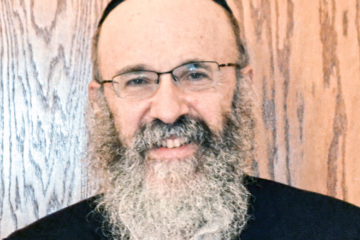Beginning again
By Rabbi Shmuel Klatzkin, Chabad of Greater Dayton

This month, we are once again starting the cycle of the Torah, reading again Bereshit, the Book of Genesis. It was my favorite part of the Torah as a child, and now reading it again and again each year as an adult, it never fails to evoke wonder and mystery.
For beginnings are truly mysterious things. The world as we find it has been our home; such comforts as we have usually come from understanding its patterns and its nature, in which we are capable of finding a home.
But Genesis pushes us out of that comfort to consider that things have not always been as they are, and that the things we take for granted — whether laws of nature or human custom — have not always been and, implicitly, may not always continue as we have become comfortable with them.
The world has a beginning, formless and void; and our own particular history has a beginning, in a man, Abraham, who accepts the imperative to leave behind all that was familiar and close.
If we are in touch with our own selves, we know that our lives, in almost every sense, are lived in a context of wildness, whether of a natural world that we cannot completely control or of an inner world that stretches both higher and lower than the world of daily business and common sense.
Knowing that the world is a strange and marvelous place is part of childhood. Children know firsthand that the world is sometimes frightening beyond control and sometimes wildly joyous. Adults would do well not to pretend that order, custom and safety are all that there is.
On releasing a critically acclaimed album of children’s music, the late musician Jerry Garcia commented on the whimsical and strange old tunes that he chose for it: “Kids like crazy stuff lurking around, things with teeth, crazy people. They’re realistic. They know the world is full of weird stuff.”
Reading Genesis each year keeps us in touch with that which is strange. There are people in it who “have teeth,” there are strange, primal emotions surging, a sense that no matter how much things develop, they are still linked to their beginnings and are still constantly emerging out of the formless void.
And each year when we reread it, for all its strangeness, for all the powerful and uncomfortably wild aspects of our own inner life that it uncovers, we know, above all, Genesis describes the real.
Genesis tells us the awareness we need to have before we get into the nuts and bolts of running a society.
Our sages long ago asked why the Torah waits all the way until the 12th chapter of Exodus before it really begins to instruct us in the Law.
Their best answer is that even more important than the Law itself is the context in which it is given. And that is established in Genesis.
The burden of Genesis is that we live in the midst of something very much larger than we are, and well beyond our ability to control from the outside.
But paradoxically, knowing our smallness in something immensely large empowers us. For though we will not long succeed in dictating to this world, we are invited to be a partner in the ongoing process of its creation.
Everyone who says Kiddush on Friday nights, say the rabbis of the Talmud, and calls to mind God’s bringing forth the world in all its newness — such a person is a partner in that work of creation.
Not a dictator; not a powerless pawn; a partner.
And in that context, we are meant to understand the rest of the Torah. The Law is not something meant to reduce us to the status of a slave, nor should it inspire us to use our mastery of it to impose ourselves on others.
It is rather a blueprint in which we are beckoned to share in the creation of our own lives and through those lives, the whole world.
And in this light, we are beckoned to approach each day anew with wonder, seeing the reality anew as spoken of in the simple weekday prayer with which Jews have started their days for centuries, joining in by praising the One “who in His goodness each day renews the work of creation.”
Join in the reading, studying each day at home, and how fine if each Shabbat at synagogue; feel the wonder and the power; and join in that partnership to realize this world as the place about which God would truly say, “Very good!”




